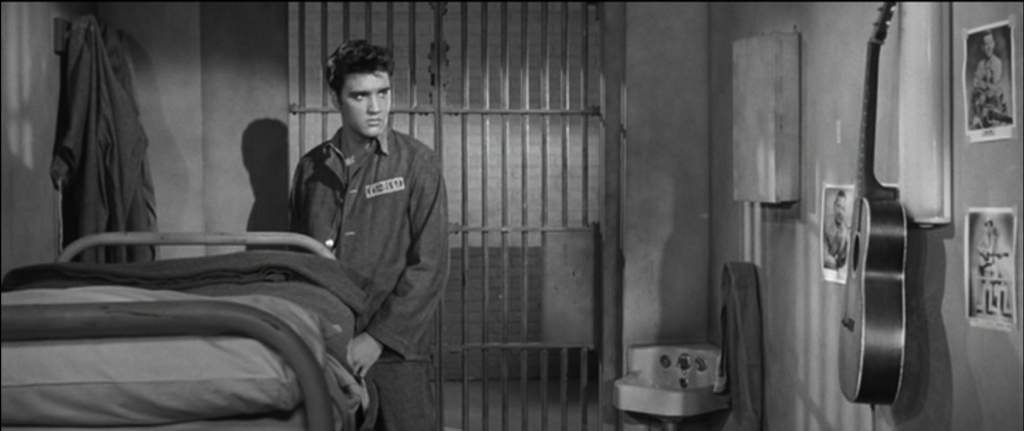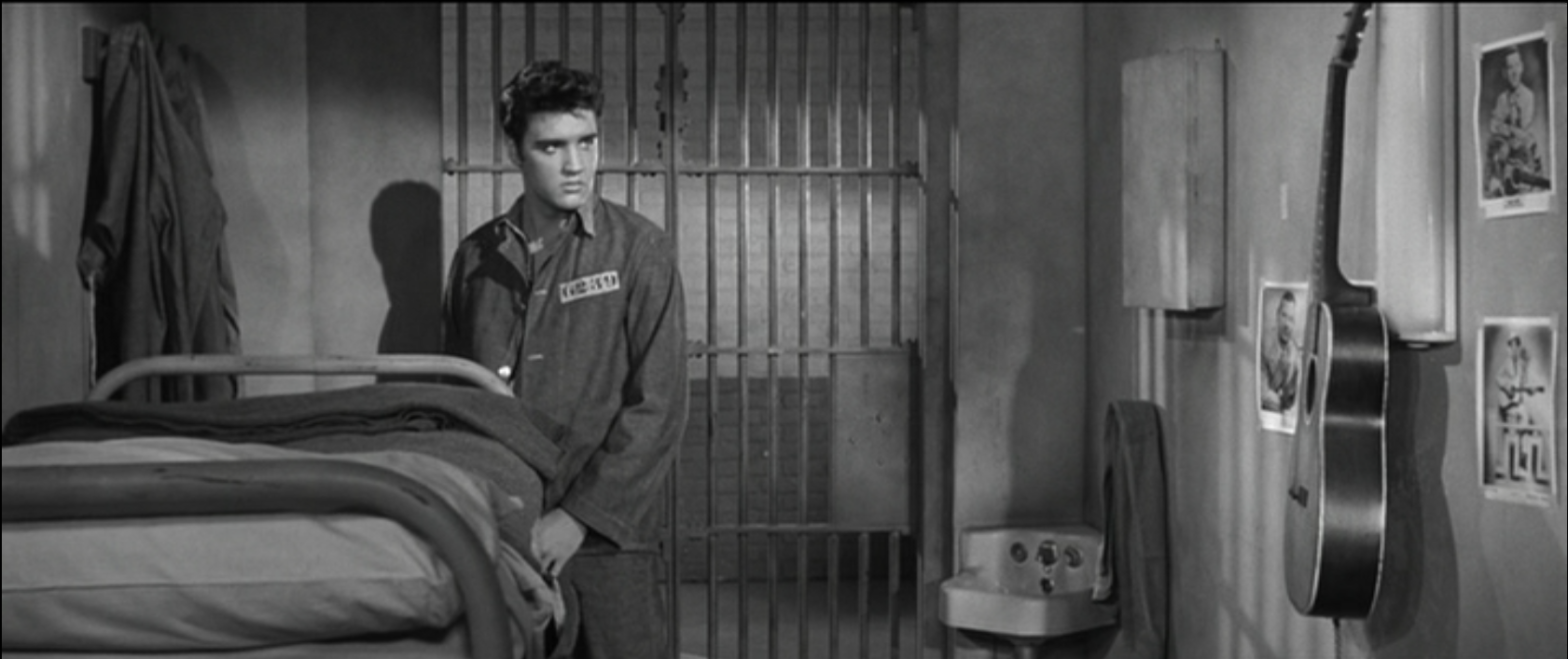Movie Review: Jailhouse Rock (1957) directed by Richard Thorpe
Vince Everett (Elvis Presley) is a nice enough young man, even if he maybe spends too much time in bars. But once he loses his temper, he doesn’t know when to stop. When another patron at the bar starts abusing a woman who was hitting on Vince, and then picks a fight, Vince punches him one time too many and winds up being convicted of manslaughter. The warden (Hugh Sanders) is…not a good man, but gives Vince a lucky break by assigning him to the same cell as former country musician turned bank robber Hunk Houghton (Mickey Shaughnessy).

Hunk is an entrepreneur who runs the underground economy of favors and cigarettes. Vince is a bit surly and very independent, so doesn’t take the old con up on becoming a full-time participant in the rackets. However, Hunk grows to like the kid and when he discovers that Vince has natural musical talent, teaches him better guitar playing and the older country style of singing.
A prisoner talent show is broadcast on television as part of the warden distracting reformers from the less than ideal conditions in this jail, and the response by fanmail convinces Hunk he’s got a potential star. (He bribes the other mailroom workers to stay silent, and the warden confiscates all the fanmail because he’s not a good person.) Hunk convinces Vince to sign an unfair contract “sharing” their showbiz salaries as the younger man is getting out relatively soon, and Hunk not for a year after that.
Vince has become more cynical in prison (especially after he finds out the warden denied him his mail) and is not overly surprised when the nightclub owner Hunk had an “in” with says the “break” he’s offering isn’t a chance to perform, but a menial barboy position. Vince hijacks the stage to prove he can sing, but the song is (in-universe) a snoozer, and Vince loses his temper at a rude patron. Thankfully, only his guitar gets broken.
Peggy Van Alden (Judy Tyler), an “exploitation man” (we’d say public relations outreach manager) for a record label, recognizes the raw talent under the mediocre performance, and helps him discover his own style that works in the modern era. Her boss says he doesn’t like the demo tape much, but will keep it overnight to have a man from New York give a listen. They don’t buy it, but the song is picked up by a much smaller label. Bad news! The song itself is public domain and you can’t copyright an arrangement (or at least you couldn’t at the time) so the first label simply had one of their already signed musicians cop Vince’s style and put out their own version so it looks like Vince is copying their man. (In real life, this more commonly happened to black artists.) Vince slaps around Peggy’s boss a bit but that’s all that can be done.
Vince convinces Peggy to quit her position and join him in creating a new label. This time Vince writes his own song so it’s copyrighted, and they convince wealthy lawyer Mr. Shores (Vaughn Taylor) to agree to back them if they can show initial success. Mr. Shores is strictly in this for money, which Vince feels is the correct approach for a manager. Sure enough, with some hard work and luck, that first record sells like hotcakes and Vince’s star rises.
By the time Hunk gets out of prison, Vince has a deal for a television special. While he’s able to score Hunk an appearance, the older man’s music is out of style and Hunk proves unable to adapt to the new music scene. His number gets cut. Vince informs Hunk that the contract they signed in prison was unlawful, and that Hunk is an ass, but he also remembers the good things the older man did for him, so keeps him on as a well-paid flunky.
Peggy is laying down hints that she wants to be a partner in more than the business sense, and Vince isn’t picking them up, being more concerned right now with advancing his career and getting way more money. They separate.
Then Vince gets a chance to star in a Hollywood movie, and the resulting drama leads us to the climax of the movie we’re watching.
This was Elvis Presley’s third movie, and the first really “Elvis” movie designed to make full use of his skillset and personality.
Vince is a decent person underneath, but his temper and later surly attitude cause friction with both friends and strangers. For example, when meeting Peggy’s parents at a party they’re throwing, they’re only slightly taken aback by him being an ex-convict (and generally this isn’t a problem for him at all) but get upset when Vince is horribly rude about jazz.
I like Peggy better when she’s a partner helping Vince navigate the cutthroat world of professional music than as a love interest, but the actress is solid throughout and has good chemistry with Mr. Presley. Sadly, she passed away between the filming and premiere so this was the only time he got to appear with her, and he was so saddened by her loss that he was unable to bring himself to come to the premiere, and possibly never saw the movie himself.
In the last third of the movie, Mr. Shores takes over as the narrator, recording his memory of events. This allows a compression of events to make time pass more quickly within the story. We never find out who Mr. Shores is narrating to.
But it’s the music that most of the fans came to the movie for, and Elvis certainly can sing, even in the parts where he’s deliberately dialing it down to represent Vince not having found his groove yet. Hunk is also a perfectly good singer for the couple of numbers he gets–his timing for that style of music is just atrocious as it would be back in favor with audiences soon enough.
Content note: Vince throws fists a few times, once lethally–no blood. There’s quite a bit of alcohol use, and some abuse. Mr. Presley is shirtless a few times, most notably when the prison warden orders him whipped. The visual depiction of the whipping and its aftermath are toned way down, but it’s made clear that this is meant as torture and the warden cruelly enjoys watching it. Vince does some non-consensual kissing, and extramarital sex is heavily hinted at.
The movie is as cynical about music showbiz as it was possible to make it under the Hays Code, so may do well with viewers who like their musicals a bit on the dark side. While naturally Elvis Presley fans will get the most out of this movie, it holds up pretty well as an actual film for a more general audience.

